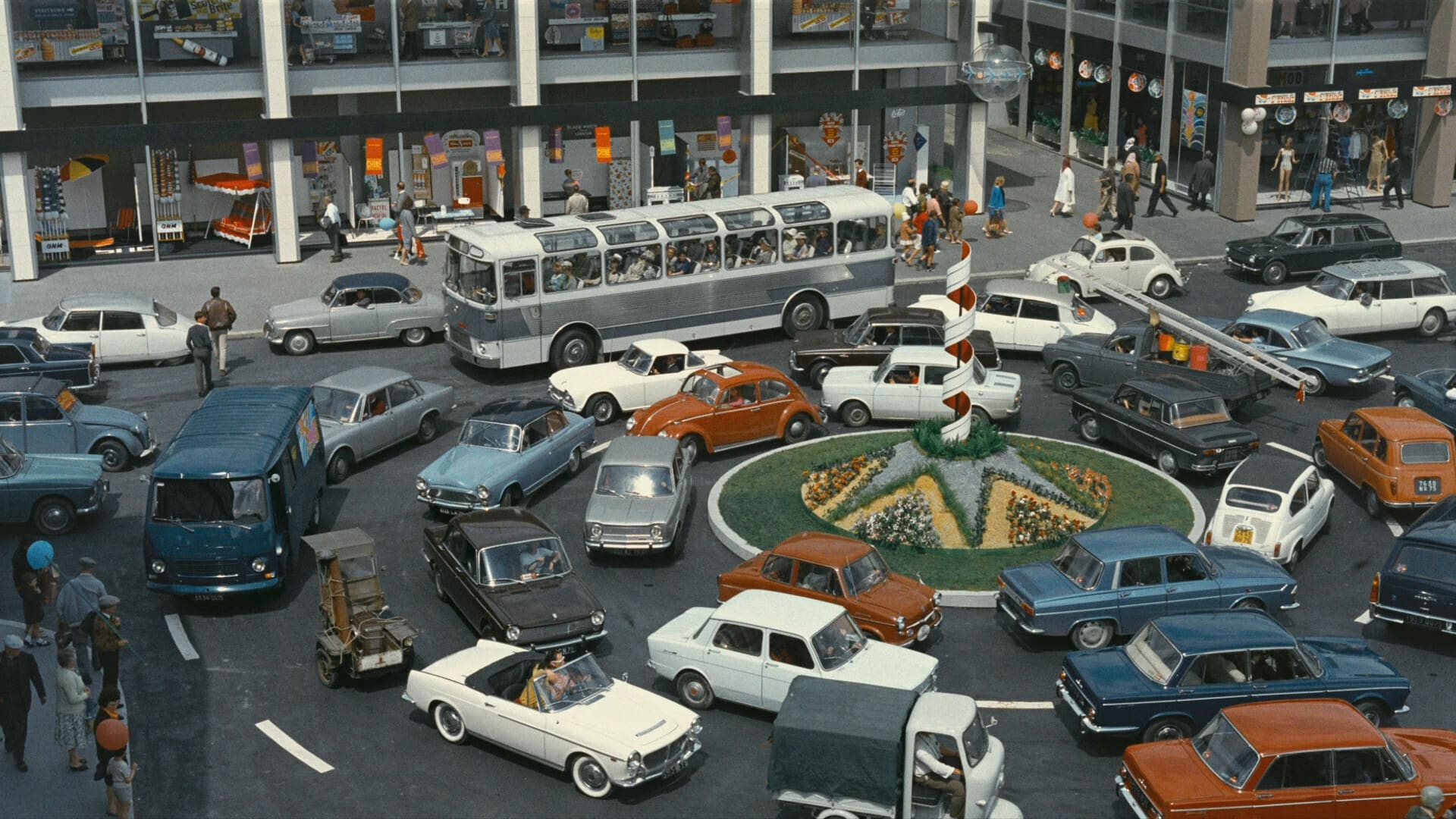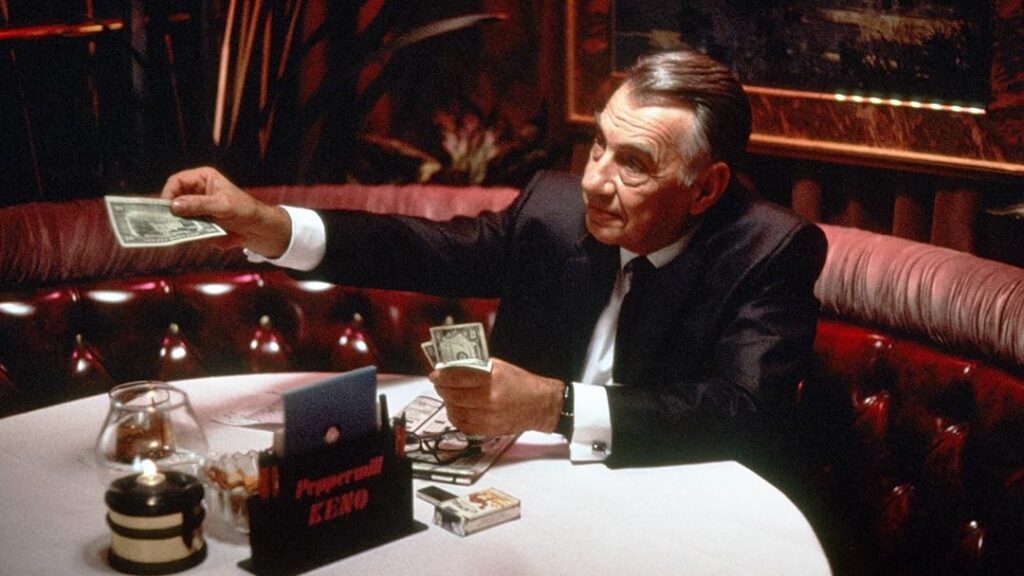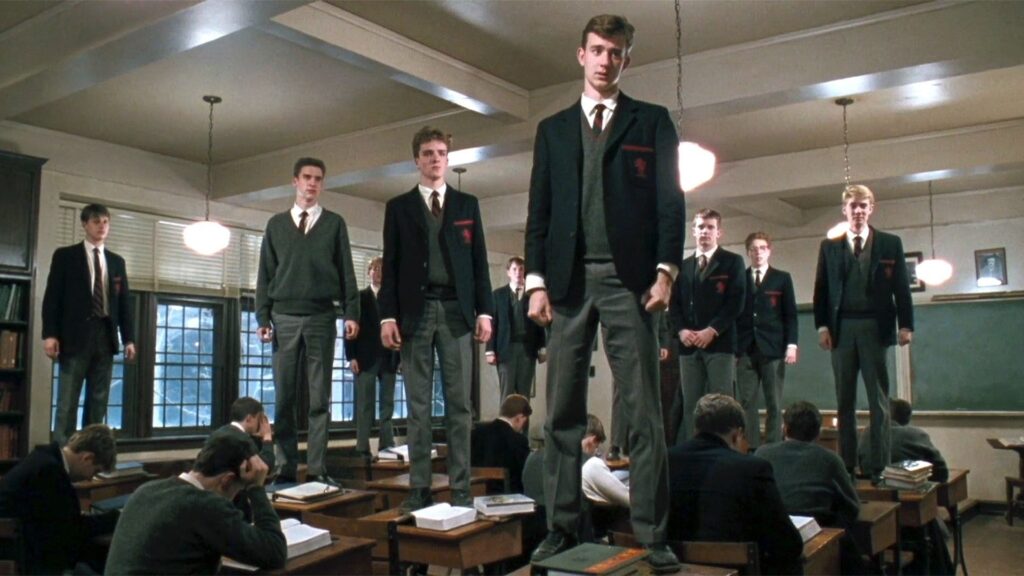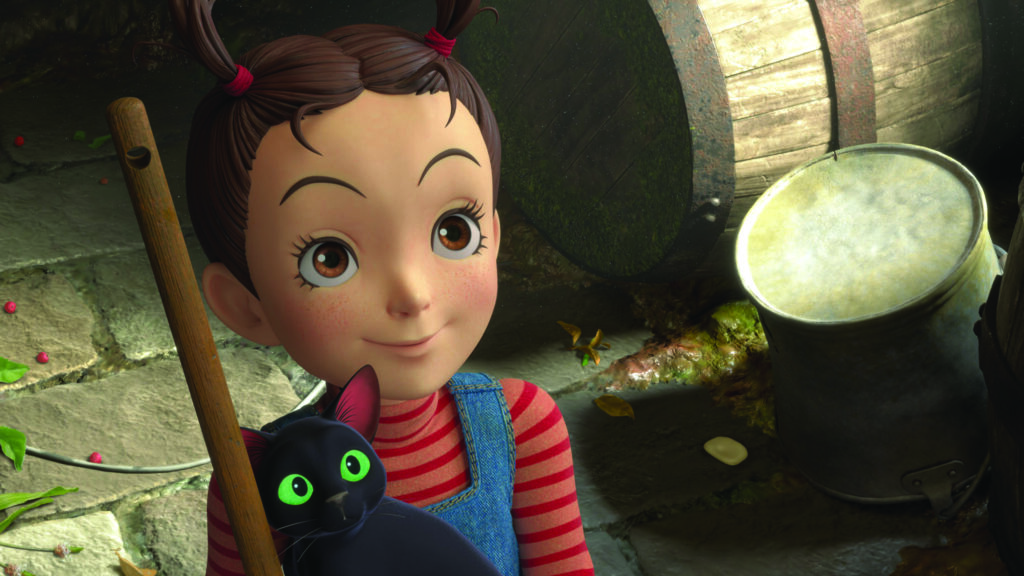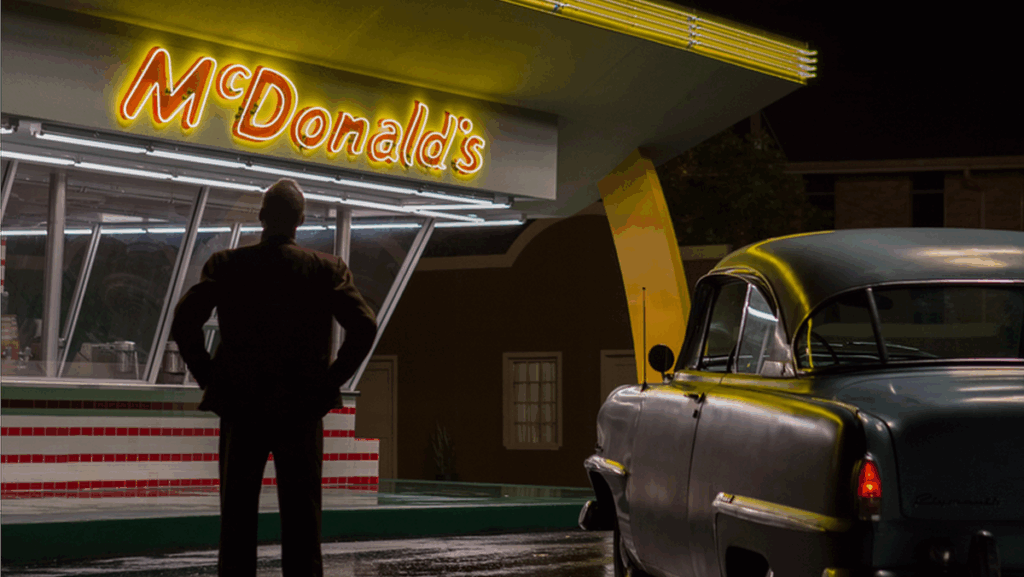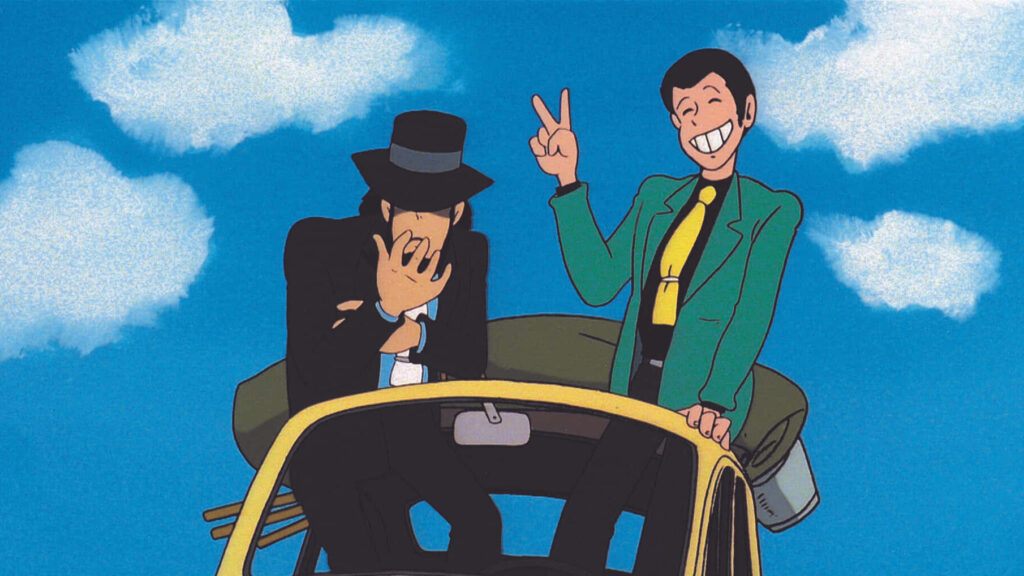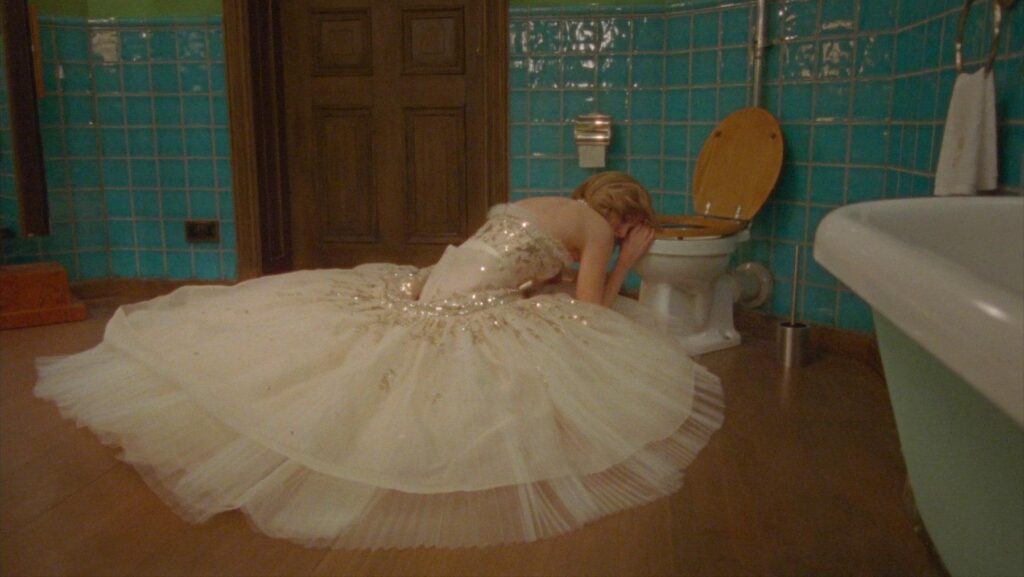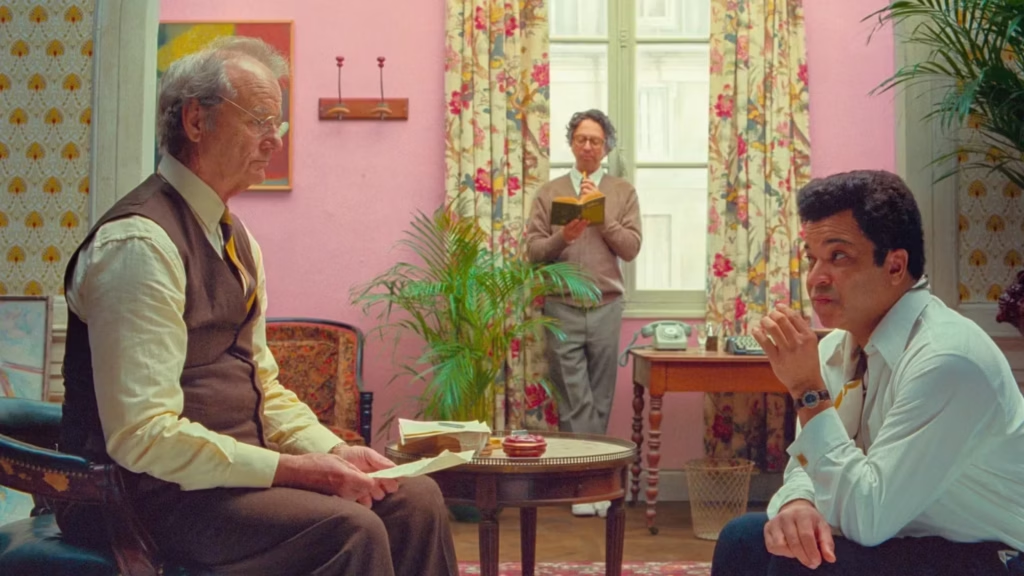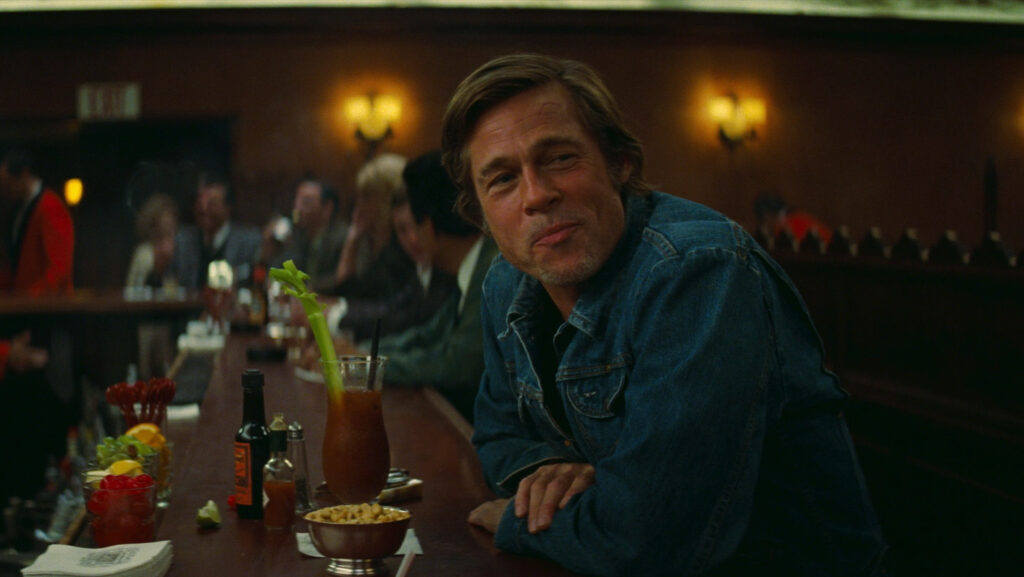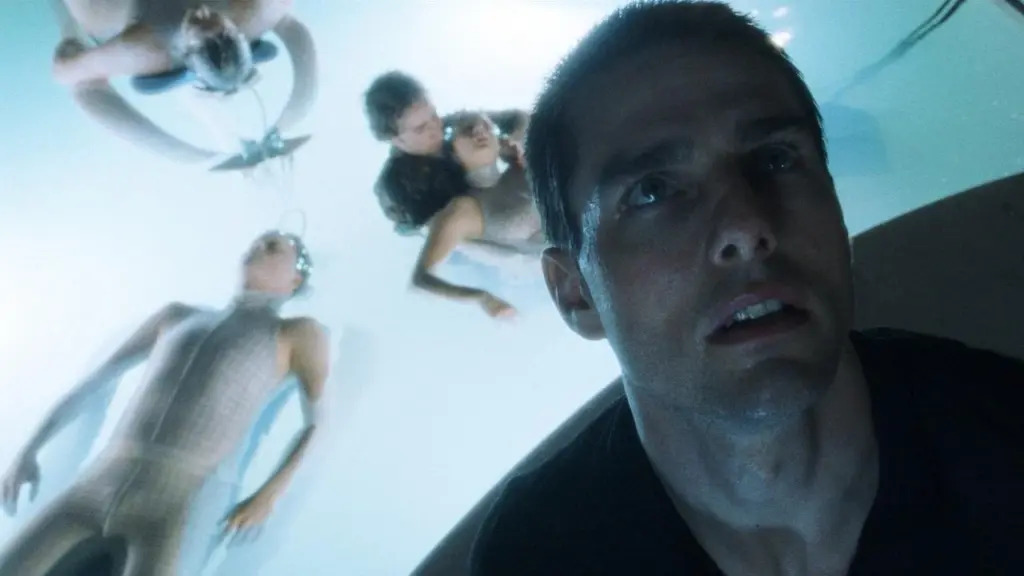Sound and dimension are used to their fullest extent to disorient Monsieur Hulot, as well as the audience, in the intricate metropolis of this macroscopic comedy.
Right from its opening moments, PlayTime gets you in the mood for exactly what you’re about to experience; the jazzy excitations of quick drum beats and cymbal crashes are an instant conveyor of tone, and an excellent audio accompaniment to the constant activity of urbanity we will soon lay eyes upon. Tati braces us with simple darkness and an immobile sky while the musical thunder astounds our eardrums (eventually led by a spirited keyboard), before entering us into the world of his imagination. Even then, Tati starts small. An expansive airport terminal with anywhere between 5 or 8 people in it at a time; only passive interactions, only impersonal glances. We are not bombarded immediately with Tati’s vision, but are eased into it with escalating extremities between sequences.
This is the conceit of PlayTime. It is a triumph in cinematic scope not because of its grandiosity, but because of its criticism of it. Every illogical function of machinery (without which the elderly may be able to operate comfortably), intercommunication turned to transaction (by which men involved in the affairs of business are served) or overcomplication of societal organization (around which the audience’s eyes may dart) exists to contribute to the ever-mounting confusion of a society built around continuous technological progress; such progress is of course motivated by an appetite for boundless economic growth, which, as we all know, is inherently illogical in the face of its social and environmental consequences. Tati recognizes the innate absurdity in rapidly developing urbanity and exposes it in its most exaggerated shape, simultaneously falsifying it into a perverse form of beauty.
I don’t believe I’ve ever seen another filmmaker depict a metropolis as well as Tati does here, and I don’t think I ever will. In every corner of the screen, the viewer can spot the interlocking functions of city residents, tourists, and workers, always colliding with one another, but never communicating, always cooperating, but never coexisting; everyone is in competition with everyone else, creating a spectacle of a non-united collective who are never in crisis, for every catastrophe is the burden of another, transpiring as an external issue that does not concern them. It is individualism revealed in its destructiveness, in which the solitary mindset of every one person naturally carries out tasks in its own self-interest, indifferent towards the hardships of others. Modernity has no room for compassion between human beings, therefore all coaction must result in a profit between parties, otherwise what good is it?
And that’s not to say of the visual wonder that Tati presents here; it is farce (and satire, really) in practice as an exercise for lightening what is so inherently grim, for creating something beautiful out of what the creator knows is monstrous, for coating the tragic realities of industrial society in a paint that is almost lascivious in its hyperbole and dynamism. To find a film that is a celebration of craft rather than content can be gratifying, to find one that is a celebration of both (and a celebration so extraordinary) is a definite miracle. The thought that popped up most often while watching was “How could someone even think of this?”, a comment that either conceives unimaginable idiocy or raucous creativity; I think it’s transparent which one I meant.
For what is definitively the second-most expensive French film ever made on production costs alone (€150,000,000 while factoring in inflation, surpassed only by the meagerly performing Valerian and the City of a Thousand Planets), it’s pretty astounding that the manner in which it flaunts its price doesn’t feel irritatingly obnoxious, but inflated gloriously for genius comic extravagance. Tati illustrates to us grand locales and skyscraping superstructures that exist only to take up more space, megalopolitan roadways that can withstand so many vehicles that most are on the road only to validate that, and compact apartments on glowing display like a dollhouse that’s been oversized and modernized. It’s simply a perfect lampoon of urbanity in its excess; where the determinate practicality of every gadget is less valuable than its immediate aesthetic, where image is what gives the constant motion meaning.
Even more exciting than the sets (which serve the function of expansive wonderment rather than spry excitement) are the performances; watching without subtitles, I didn’t even consider trying to find out what the French speakers were saying until about halfway through (which may have to do with my minor understanding of French but nonetheless), a testament to how each actor communicates their character’s eccentricities with such effective physicality. It’s a feat to have scores of extras be controlled so heavily, and yet see the result appear universally haphazard; surely, no event wasn’t planned, but somehow Tati manages to administer a spontaneity to each member of the innumerable cast, supplanting their personalities with his influence and transforming them into miniature Tatis themselves.
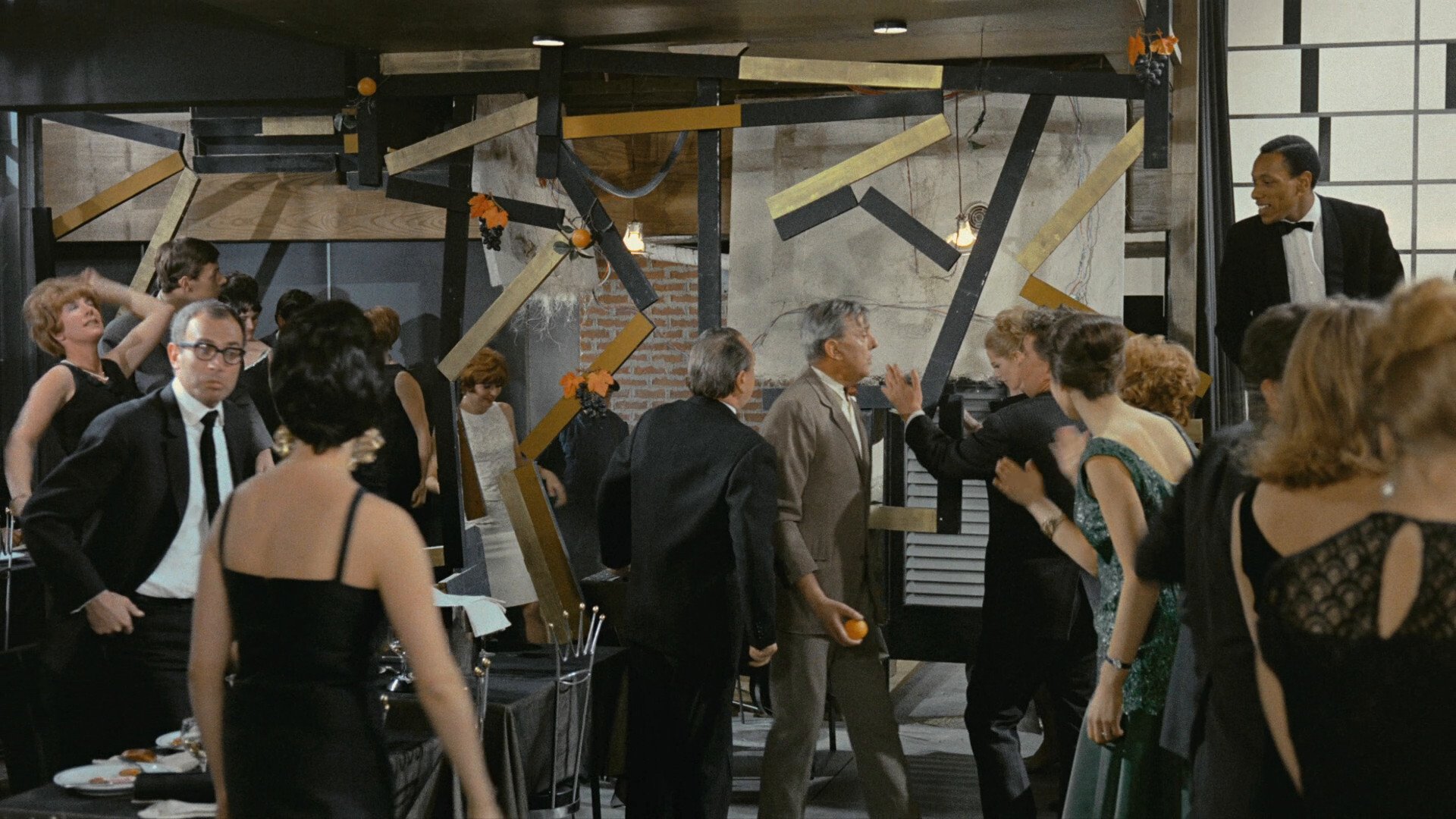
Every cast member’s peculiarities are perfectly distinct from every other; within each social sphere, even during the restaurant sequence only, unique qualities flourish from every character, from the staunch conviction of bourgeois restaurant goers revealed to be naiveté in distinguishing how exactly luxuries manage to fall at their feet, to the reckless maladroitness of waiters who are desperate to quite literally serve to their every need, all the way down to the quickness of the working class who rush themselves out of the way so as not to remind their upper class masters of the toil that builds their lotus land. Energy exudes from every role, but each one has a different charge, some intangible spirit that can’t be condensed into simple adjectives or descriptions. For pantomime to be this ubiquitously compelling mustn’t be undercut in its transcendence of conventional acting quality, and thankfully, has been celebrated rightfully by practically every PlayTime viewer.
As for that restaurant sequence, it is, in my eyes, clearly the most glorious (and also the longest) achievement of PlayTime’s social commentary; in all it’s Veblenian besiegements of conspicuous consumption on the part of those who carry wealth and assertions of the inherent proletariat privation for such leisure to be enjoyed, it intensifies the element of social performance in the interactions between members of high society, gradually loosening them while their emotional reticences dissolve and the consequences of their luxury expose themselves. Over the course of the evening, we see the burning, collapsing, and combustion of the Royal Garden on its opening night, a disastrous state of impoverished ruination that the wealthy laugh and jeer at as the working class hurt themselves to clean up their unsustainable lifestyles; a simple, but potent metaphor for the same economic collapses for which the ruling class are directly responsible in their haste and greed, but whose repercussions are suffered by the workers who don’t have the resources to rebound from their crisis. I believe Tati knew exactly why he made this sequence the longest one in the entire film, for its sociological intuition is certainly the height of all political satire in this already politically vitalizing exercise.
Tati’s gags here are as much about sound as they are about visuals, in that the purposeful usage of both leads them to dance in tandem with one another for the formation of fully realized panoramas of the senses. With a proper sound system, the loud crashes and bangs of slapstick direct your eyes over to the exact point on the screen they came from, distracting you from the infinite other jokes going on between characters and set decoration. Creative sound effects, namely the waiting room chairs that breathe in and out as people sit on them, indicate some of the most well-crafted (and certainly some of the funniest) points in the film; the hilarious vocal fluctuations of French and American actors alike even more so. With voice and noise, Tati reveals his genius in cinematic design beyond the muted colourization of his photography or the gradual induction of amble kinetics over precise beelines, exacting an auditory experience just as rich as his optical one.
Before PlayTime‘s end, the urbanity, now vibrant when it was once decidedly uniform, almost becomes symphonic in its bombast, like the population of this exceedingly futuristic cityscape colliding with one another’s instruments of labour and recreation as an orchestra for the dreams of modernity. The deep inefficiency of industrial existence is no longer found, and is instead replaced with the nonsensical ideas of perfectly functioning machinations within a capitalist paradise; tourism now booms when only the handful of women on a bus were followed before, workers perform tasks eagerly where they would do it only out of necessity during earlier scenes, and the city, in its seemingly doubled scale, interlaces without failure or hindrance, where before, we saw a constantly cutthroat order of operations in which work couldn’t be performed without obstructing someone else’s. All of it is scored by an unwavering circus tune, uncovering that what we’re seeing is a fantastical spectacle of what industrialization can be, artificial motion in practice only to ensure the society stays utopian, pretending as though there is any productivity at all. The final shot turns the lights off on all these delusions, and though the music of their idealism rages on, reality’s darkness consumes the screen.
